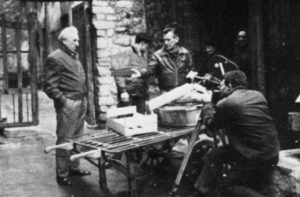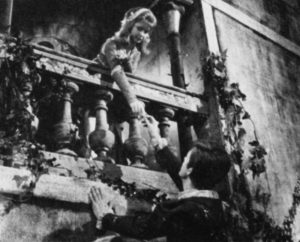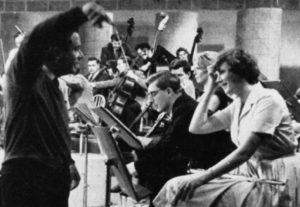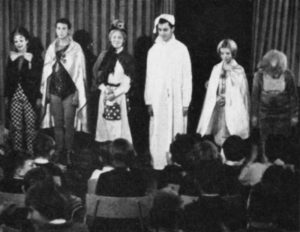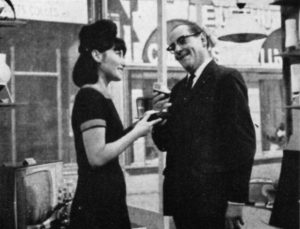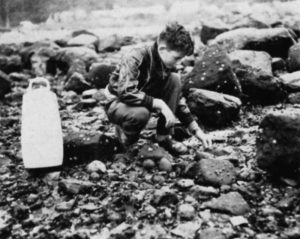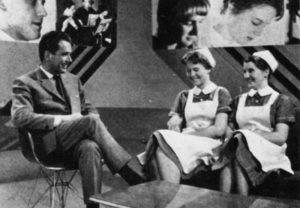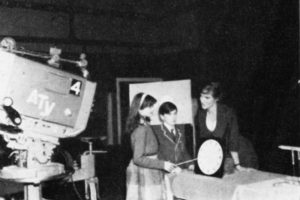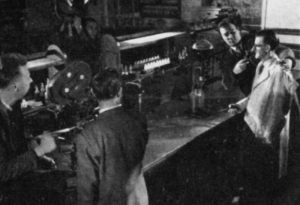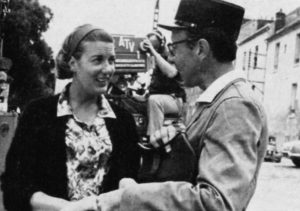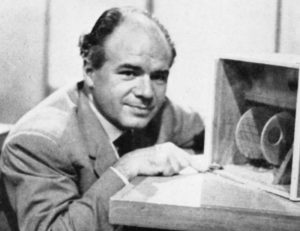
The first Independent Television programmes for schools in the United Kingdom were introduced in May 1957 by Associated-Rediffusion in London. From the same date, the programmes were transmitted by Associated Television in the Midlands region. At the time, this service to schools was very much an act of faith, since fewer than one hundred schools in these areas were equipped to receive television. Six years later, Independent Television’s thirteen series are seen virtually throughout the country and over 4,000 schools are registered with the Programme Companies.
Producing Companies
Although thirteen Programme Companies transmit programmes for schools, the bulk of the programmes are produced by Associated-Rediffusion, Associated Television and Granada TV Network. In addition, Scottish Television produces some programmes for Scottish schools only, and makes occasional contributions to Associated-Rediffusion’s output.
These programmes are financed from the normal revenues of the Programme Companies and there is no advertising during school broadcasting hours.
The BBC also operates its own regular television service for schools, in addition to its long-established sound service. In the interests of the schools, great care has always been taken by both sides to avoid duplication and overlapping.
Educational Supervision
The Authority, on the advice of its Children’s Advisory Committee, laid down that the production and presentation of school programmes should have responsible educational approval.
The Children’s Advisory Committee drew the Authority’s attention to three stages at which educational advice was essential. The first was in the actual devising of programmes, in order to ensure that they were educationally reliable. The second was in the planning of the syllabus of television lessons so that too much time should not be devoted to particular subjects or classes of subjects, or to particular types of schools or age groups of pupils, and so that there would be no clash of timing either between companies or with the BBC. The third was in the provision of adequate advance information and teachers’ notes and the establishment of a sound “feed-back” of information so that on the one hand schools would be able to make the fullest use of programmes both in regard to preparation and follow-up and on the other hand producers would be made aware of the views of teachers about their products.
Each of the four producing companies therefore appointed a Schools Broadcasting Committee under an independent Chairman containing, besides members chosen for their individual contributions, a majority consisting of nominees of the following bodies:
- The County Councils’ Association
- The Association of Municipal Corporations
- The Association of Education Committees
- The National Union of Teachers
- The Joint Committee of the Four Secondary Associations
- The Association of Teachers in Technical Institutes
All the companies producing school programmes (A-R, ATV, Granada and Scottish Television) have Committees fulfilling these conditions. Chaired by leading educationists, these advisory bodies include among their members practising teachers with first-hand knowledge of the use of television and other visual aids in the classroom, as well as representatives of all the major educational interests, including the Ministry of Education and the Scottish Education Department. The separate advisory bodies of the four producing companies determine the general educational policy which is to be reflected in the programmes. Moreover, it is agreed policy that no producing company will offer a programme for networking unless its general scope and purpose has been considered and approved by each of the other advisory bodies.
In the case of companies presenting but not producing school programmes the Children’s Advisory Committee thought that educational needs would be met if these companies appointed small Schools Broadcasting Committees or experienced education officers to ensure that account was taken of local educational opinion in the selection of a balanced syllabus for the area.
Programme Production
The main emphasis of all programme series now shown is in the direction of supplementing and enriching the teachers’ own work in the classroom. Once an advisory body has recommended the subject, educational purpose and age range of a programme series, a detailed programme proposal is drawn up by the respective company’s Schools Broadcasting Department. When this has been approved or amended by all the advisory bodies concerned it is passed back to the originating company’s production team. These teams normally consist of a producer who is an experienced educationist, a programme director who is a television expert, a script writer, and, if necessary, a consultant who is a specialist in the subject of the series and who is contracted to advise on that particular series only.
Networking
Each year twelve months in advance, the companies producing school broadcasts put forward proposals for the series which they wish to provide in the following year. Proposals which are accepted by all the four educational advisory bodies are then incorporated in a national network timetable for regular transmission simultaneously throughout Britain. Over and above this, the producing companies, on the recommendation of their advisory bodies, may add to the networked pattern by providing additional transmissions specially for their own regions. These additions may be either repeats of networked programmes or additional series selected from among those proposed but not chosen for the national network. The remaining independent companies, acting on appropriate educational advice, have the choice of transmitting any or all of these additional programmes according to the requirements of the schools within their own regions.
Liaison with Schools
Close liaison with schools is carried out by Company Education and Schools Liaison Officers, who visit schools and maintain a two-way flow of information about the programmes between teachers and producers and who also watch the programmes in use in the classroom and report back on them. In addition, panels of viewing teachers report regularly on pupil and teacher reactions to the programmes, and comment upon their educational effectiveness. Meetings of both teachers and schools broadcasting staff are regularly organised to discuss the programmes. All this information is passed back to the advisory bodies as a basis for future planning.
Programme Literature
An outline of the programmes for the following school year is published each May so that schools may have adequate time to register as television viewers and make the timetable arrangements necessary to accommodate the programmes. Programme Notes for individual series are then sent, free, to the registered viewing schools before the beginning of each term, additional copies being available at a small charge.
Some special publications are also prepared, such as complete dialogues from some language programmes, and diagrams related to science programmes for younger children.
The Independent Television Schools Broadcasting Secretariat
Although the selection of the programme pattern transmitted by any one company is comparatively simple, the co-ordination of programmes between many companies, regions, schools and education authorities is inevitably a complicated matter. It is for this reason that the Secretariat has been established as a central co-ordinating office, whose responsibilities embrace:
- Advising all the Companies of the programmes that are to be networked nationally, and offering them the choice of additional programmes for transmission in their respective regions, collating their replies and placing their orders for programme literature. Coordination between the Producing Companies, Regional Companies and Printers about annual programmes, timetables, programme notes and all ancillary literature.
- Co-ordinating the despatch of programme literature to the various regions so that teachers are in no doubt which programmes they can receive.
- The maintenance of a record of all registered viewing schools and the compilation of up-to-date statistics.
- Provision of an information service, both national and international, about activities and developments in all fields of educational television.
- Maintenance of a reference library including films and telerecordings for demonstration purposes.
- Co-ordinating research into the reactions of schools to programmes.
- Finally, acting as a general clearing house on any subject dealing with Independent Television schools broadcasting.
Chairmen of Advisory Committees
- Sir John Wolfenden, Vice-Chancellor, The University, Reading, Berks. (Chairman of the Independent Television Authority’s Children’s Advisory Committee.)
- Sir Ifor Evans, Provost, University College, London. (Chairman of Associated-Rediffusion’s Educational Advisory Council.)
- Sir John Masterman, Sometime Vice-Chancellor of the University of Oxford. (Chairman of Associated Television’s Education Advisory Committee.)
- Professor W. Mansfield Cooper, Vice-Chancellor, The University, Manchester. (Chairman of Granada TV Network’s Educational Advisory Committee.)
- Dr. H. Stewart Mackintosh, Director of Education, Glasgow. (Chairman of Scottish Television’s Educational Advisory Committee.)
Schools Liaison Officers
London: John Mackay, Schools Liaison Officer, Associated-Rediffusion Ltd., Television House, Kingsway, London W.C.2. The Midlands: William Hemingway, Education Liaison Officer, Associated Television Ltd., 150, Edmund Street, Birmingham 3. The North: Peter Ash, Schools Liaison Officer, The Granada TV Network Ltd., Manchester 3, and Frank A. Harris, Schools Liaison Officer, The Granada TV Network Ltd., Headrow House, Leeds 1. Central Scotland: Peter Whiteford, Schools Liaison Officer, Scottish Television Ltd., Theatre Royal, Glasgow. South Wales and the West of England: The Education Officer, T.W.W. Ltd., Pontcanna Studios, Cardiff, or Schools Liaison Officer, T.W.W. Ltd., Television Centre, Bristol. Central, Southern and South-East England: Charles Cross, Education Officer, Southern Television Ltd., Northam, Southampton. North-East England: Brian Shallcross, Schools Liaison Officer, Tyne Tees Television Ltd., The Television Centre, City Road, Newcastle upon Tyne. East Anglia: Paul Johnson, Schools and Children’s Programme Officer, Anglia Television Ltd., Anglia House, Norwich. Northern Ireland: S. Gordon Duffield, Executive i/c School Programmes, Ulster Television Ltd., Havelock House, Ormeau Road, Belfast. South-West England: Dr. Charles F. Jones, Education Officer, Westward Television Ltd., Derry’s Cross, Plymouth. North-East Scotland: The Education Officer, Grampian Television Ltd., Queen’s Cross, Aberdeen. Channel Islands: The Education Officer, Channel Television, Television Centre, St. Helier, Jersey, C.I. Wales (West and North) Region: The Education Officer, Wales (West and North) Television Ltd., Wales Television Centre, Cardiff.
Independent Television Schools Broadcasting Secretariat: Denis Fox, I.T.V. Schools Broadcasting Secretariat, 4 and 5 Grosvenor Street, London W.1.
| STORY BOX | |||
|---|---|---|---|
| (Spring Term 1963) | |||
| For primary schools – Age range 8-10 |
| WEEK | WEEK | ||
| 1 | Books to Enjoy. “The Hartwarp Light Railway” by John Pudney. | 7 | Half-term repeat of programme broadcast in Week 6. |
| 2 | Adventures of Today. Journey to the Lost World. (Expedition to a strange mountain in South America.) | 8 | Books to Enjoy. Theseus and the Minotaur. (Stories from Greek myth and legend.) |
| 3 | Life in Other Lands. Indians of the Amazon. | 9 | Nature Study. Looking at Fish. |
| 4 | Life in Other Lands. Indians of the Andes. | 10 | Nature Study. How Animals Move. |
| 5 | Story of Everyday Things. Coins. | 11 | Adventures of Today. The Barbican. |
| 6 | Story of Everyday Things. Meals. |
| AUF DEUTSCH | |||
|---|---|---|---|
| (Spring Term 1963) | |||
| Intermediate German – Age range 14-16 |
| WEEK | WEEK | ||
| 1 | Zu Hause in Deutschland. An interview with a German housewife about her home and housekeeping in Hamburg. | 6 | Schmuggler und Grenzen. A Customs Officer at Hamburg Airport describes his experiences. |
| 2 | Besuch aus dem Wald. A forester from the Black Forest talks about his life and work. | 7 | Half-term repeat of programme broadcast in Week 6. |
| 3 | Ein Anzug aus Samt. An interview with a carpenter who belongs to a medieval Guild which still dictates to its members their conditions of training and ceremonial dress. | 8 | Aschenputtel kommt zu Besuch. A drama student tells, with mime, the end of the Cinderella story. |
| 4 | Mit Rucksack und Wanderkarte. Hiking and youth hostels in Germany. | 9 | Das Rote Kreuz im Edelweiss. A young man who is a member of a mountain rescue team demonstrates the equipment. |
| 5 | Marzipan aus Liibeck. A waitress from a Liibeck restaurant, which specialises in making marzipan, discusses her work. | 10 | Jeden Tag etwas Neues. A young woman reporter from a Liibeck paper talks about her work. |
| 11 | Silber, Gold und Stahl. Introducing an industrial designer who first trained as a goldsmith. |
| WORD AND IMAGE | |||
|---|---|---|---|
| (Spring Term 1963) | |||
| Age range 15-18 | |||
| A series about the images in literature, introduced by Dr. W. M. Merchant, Professor of English in the University of Exeter. |
| WEEK | WEEK | ||
| 1 | Paradise Lost. Milton’s image of man’s fall. | 6 | Portraits of People. Chaucer’s Canterbury Pilgrims. |
| 2 | Landscape in Art. Eighteenth century “Picturesque”. | 7 | Half-term repeat of programme broadcast in Week 6. |
| 3 | Natural Landscape. Wordsworth’s “rocks and stones and trees.” | 8 | Sea Imagery. Coleridge’s Ancient Mariner. |
| 4 | Desert and Storm. The heath and storm scenes in Shakespeare’s King Lear and Macbeth. | 9 | Light and Dark. Dylan Thomas’s “Do not go gentle into the good night”. |
| 5 | Island and Forest. Human and fairy worlds in The Tempest and A Midsummer Night’s Dream. | 10 | The Journey of the Magi. T. S. Eliot’s poem of Memory. |
| 11 | Isolated Man. Islands from Robinson Crusoe to Lord of the Flies. |
School Programmes 1962-63
| Programme | Description | Company | Mins. | Time & day |
|---|---|---|---|---|
| Science and Understanding | Present-day biology and physics. Age range 14 and over | A-R | 20 | 3.11 Monday |
| 3.26 Wednesday | ||||
| The World Around Us | Science and History. Age range 10-12 | A-R | 18 | 2.35 Tuesday |
| 2.54 Thursday | ||||
| Drama or Social Studies | Romeo and Juliet; Theatres and Temples; Everyday Economics. Age range 13 and over | A-R | 25 | 3.26 Tuesday |
| 3.16 Thursday | ||||
| Story Box | Informative miscellany. Age range 8-10 | A-R | 18 | 2.35 Wednesday |
| 3.04 Friday | ||||
| Notre Ville | Elementary French — for 2nd and 3rd years | A-R | 15 | 2.35 Thursday |
| 3.26 Friday | ||||
| lci la France | French for Sixth Forms | ATV | 20 | 12.20 Monday |
| 3.16 Thursday | ||||
| Auf Deutsch | Intermediate German. Age range 14-16 | ATV | 15 | 2.35 Monday |
| 12.20 Tuesday | ||||
| 3.26 Wednesday | ||||
| Summing It Up | Primary mathematics Age range about 10 | ATV | 13 | 2.54 Monday |
| 2.35 Tuesday | ||||
| Chemistry for Sixth Forms | Advanced level chemistry | ATV | 20 | 3.35 Monday |
| 12.20 Wednesday | ||||
| 3.40 Thursday | ||||
| French from France | Intermediate French—for 3rd and 4th years | ATV | 20 | 2.35 Wednesday |
| 12.20 Thursday | ||||
| 3.26 Friday | ||||
| The Art of Music | Musical composition. Age range 13 and over | Granada | 25 | 1.00 Monday |
| 11.40 Tuesday | ||||
| 2.35 Friday | ||||
| Discovery | Science for Sixth Forms | Granada | 25 | 2.57 Tuesday |
| 11.40 Thursday | ||||
| 1.00 Friday | ||||
| Art in the Making/Word and Image | Artistic creation examined. Imagery in literature Age range 15-18 | Granada | 25 | 11.40 Wednesday |
| 2.57 Wednesday | ||||
| 1.00 Thursday |
Note: The programme series listed above are not all seen in every Independent Television transmission area and there are variations from area to area in the number of times the various programmes are repeated during the week. Scottish Television contributes individual programmes for the Associated-Rediffusion series and produces occasional programmes for Scottish schools only.

